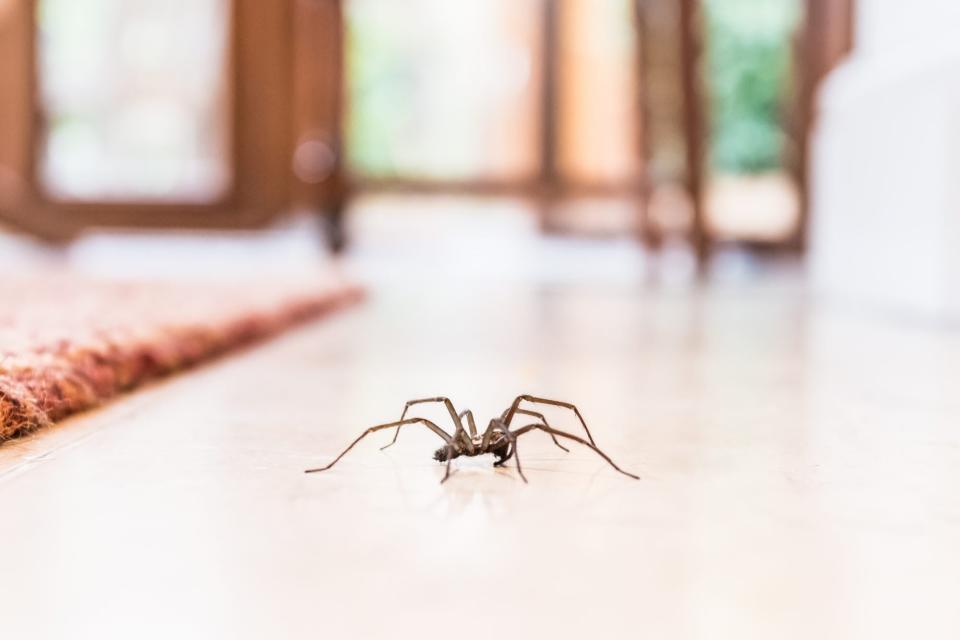How to Keep Spiders Out of Your Home for Good
Spotting spiders in your home is always a little spooky, but do keep in mind that they are usually seeking refuge in your space for a specific reason. "They enter our homes in search of food, water, and shelter," Chris Lambton, a gardening expert and HotShot partner, notes. "Spiders eat other insects, so if they are in your home, spiders will have a food supply." Think: flies, ants, fleas, mosquitoes, cockroaches, and moths (more creatures you'd rather not see!). Plus, as Kari Warberg Block, a pest prevention expert, author, and the CEO and founder of EarthKind®, says, the aforementioned bugs could carry disease-causing pathogens, so having spiders around can actually be helpful. But since your space gives these pests a sense of safety, it also gives them a secure place to reproduce (ah!). and some of these critters can be deadly. To rid your home of spiders, heed our expert-approved tips, ahead.
Related: How to Protect Your Pantry Staples from Mold and Pests
Close off and block entry points.
One of the best ways to keep spiders at bay is simply by blocking their points of entry. "They enter your house through small cracks, air vents, holes in screens, or other openings," Lambton says. Get a magnifying glass, Warberg Block adds, and find the tiny cracks in your walls. From there, seal the openings with caulk, screening, or weather stripping.
Keep your home clean.
This likely goes without saying, but tidying up your space is also a helpful pest prevention tactic. Vacuuming often, cleaning corners and crevices (plus windows, junk rooms, and basements), and frequently checking behind your recycling stash of cardboard boxes (spiders like these!) will prevent them from nesting in these hiding places. The same goes for the areas outside of your home. Warberg Block notes to regularly check and clean your exterior lights, windowsills, woodpiles, and all entry points.

CBCK-Christine / Getty Images
Get rid of spider webs.
"To make your home less attractive to spiders, wash old webs off outside areas with a garden hose—particularly under roof eaves," notes Warberg Block. "In the home, vacuum up existing spider webs and spray the area with a mixture of half a cup of water, half a cup of vinegar, two tablespoons of liquid dish soap, and twenty drops of thyme oil." She says that this scented mixture will prevent them from attaching their silk to sprayed surfaces. In turn, they won't be able to make new webs.
Fix leaks.
Leaks are never ideal, but this issue can prompt spiders to enter, too. Anything from a leaky faucet to water dripping from the ceiling can invite them in, so you'll want to get those repaired as soon as possible.
Related: What Creepy Crawlers Can You Expect to Find in Your Home During the Fall?
Think about landscaping.
Tending to the greenery around your home can also keep spiders at bay, including your lawn and plants. As long as these are trimmed and cut back, you'll be able to limit spiders' access to your house, Lambton says. Go the extra mile and create distance between your shrubbery and your home altogether. Warberg Block explains that this separation will lessen the chance they have of wandering inside.
Play music.
"Spiders don't have good eyesight, so they rely on vibrations they feel in their web to detect an insect that could be their next meal," Warberg Block says. "Turn music on in an area where you've spotted spiders and the vibrations will interfere with their ability to pick the perfect time to feast." They'll then move to find a quiet area elsewhere.
Turn on the lights.
If you ever want to catch a spider that you think is lurking, hit the lights. Since they avoid bright spaces, they usually make their webs where it's dark. So, if you see a spot in your home where it's usually dark, keep the light on for a while and they will likely try to find a new hiding spot. If you're trying to keep them at bay in an outdoor dwelling area (like a garage or porch), yellow-tinted lights are better than standard bulbs; spiders aren't attracted to this type of light.
Exterminate safely.
If you see a spider, you can easily exterminate on contact with a bug spray, like the Hot Shot Ant, Roach & Spider Killer ($13.01, amazon.com). Deterrents can also do the trick; consider EarthKind's Stay Away® Spiders Deterrent ($25.80, earthkind.com), which you can place in an infested area to banish critters for at least 30 days. However, you can also enlist the help of a professional. "While 80 percent of people choose the DIY approach, 20 percent of households turn to pest control professionals," Warberg Block says. "Before hiring a technician, you'll want to verify that they are licensed to apply pesticides in your state, that they are insured, and find out if they will be using an integrated pest management (IPM) plan that includes getting rid of the current infestation as well as taking steps to prevent future problems."

